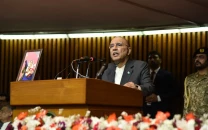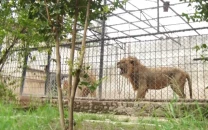A discriminatory system: Existing laws exploit the vulnerable, say activists
Piler workshop underlines the need to give marginalised communities their due rights.

Minorities, women and disabled persons face discrimination in Pakistan, with existing laws depriving them of their due rights, said civil society activists at an orientation workshop on Tuesday.
The workshop on 'Fundamental Rights and Contemporary Challenges for Marginalised Communities' was organised by the Pakistan Institute of Labour Education and Research (Piler) at Regent Plaza Hotel.
"The powerful have always exploited the law," declared Piler chief executive Karamat Ali. "The poor have no access to justice because of influential people." He also stressed that judges should put aside their religious inclinations when conversion cases are brought before them in court.
"What our society needs is tolerance," said Urban Resource Centre's Zahid Farooq, going on to say that the government needed to accelerate its decision-making with regard to the problems of marginalised populations.
Advocate Aman Sheikh believed that the system was crumbling, with most of its institutions on the verge of collapse. "The political system is corrupt," he said. "The troubles faced by the poor in each community will become unbearable if a stronger system is not established soon."
Meanwhile, Sindh Assembly lawmaker Naheed Begum urged for public awareness regarding the bills which are passed in the assemblies. She pointed out that many of the highly-debated bills, such as those regarding domestic violence, had brought no relief to those they were meant to help. She also added that legislation is desperately needed for marginalised communities. Piler programme manager Farhat Fatima continued on the same note, adding that even institutions are often unaware about the bills that have been passed, such as the Child Marriage Act.
The workshop's participants also emphasised that vulnerable communities would continue to face challenges if discriminatory laws were not changed.
Published in The Express Tribune, September 11th, 2014.



















COMMENTS
Comments are moderated and generally will be posted if they are on-topic and not abusive.
For more information, please see our Comments FAQ